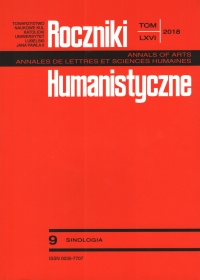Społeczno-kulturowe uwarunkowania narracji wychowawczych: Analiza eksploracyjna wypowiedzi matek chińskich
Abstrakt
Głównym celem przedstawionego w niniejszym artykule badania była analiza wpływu czynników kulturowych na metody wychowawcze. Dziewięciu chińskim matkom z Pekinu zadano kilka pytań dotyczących wychowania ich małoletnich dzieci. Dokładnie przeanalizowano odpowiedzi matek, wyłaniając na ich podstawie osiemnaście kategorii badawczych, takich jak np. „nawiązanie do uczuć dziecka”, „dziecko jako boss”, „reprymenda” itd. Te kategorie badawcze poddano szczegółowej eksploracji. Badanie potwierdziło, że matki chińskie są bardzo zaangażowane w wychowanie dzieci, często ich opiekuńczość przechodzi w nadopiekuńczość. Pozycja dziecka w rodzinie, ze względu na zmiany demograficzne, społeczne i kulturowe, również uległa transformacji. Dziecko zajęło kluczowe miejsce, a jego potrzeby stały się najważniejsze.
Bibliografia
Afek, Joanna, i Arkadiusz Gut. 2017. „O chińskim modelu wczesnej edukacji dziecięcej w kontekście międzykulturowych badań psychologicznych”. Roczniki Humanistyczne 65, fasc. 9: 5–28. DOI: http://dx.doi.org/10.18290/rh.2017.65.9-1.
Camras, Linda A., Sun Keping, Brittney R. Fraumeni i Yan Li. 2017. „Interpretations of Parenting by Mainland Chinese and U.S. American Children”. Parenting 17, no. 4: 262–280. DOI: http://dx.doi.org/10.1080/15295192.2017.1369330.
Chao, Ruth K. 1994. „Beyond Parental Control and Authoritarian Parenting Style: Understanding Chinese Parenting thought Cultural Notion of Training”. Child Development 65, no. 4: 1111–1119. DOI: http://dx.doi.org/10.1111/j.1467-8624.1994.tb00806.x.
Chao, Ruth K. 2001. „Extending research on the consequences of parenting for Chinese Americans and European Americans”. Child Development 72, no. 6: 1832-1843. DOI: https://doi.org/10.1111/1467-8624.00381.
Chen, Xinyin, Qi Dong i Hong Zhou, 1997. „Authoritative and Authoritarian Parenting Practicesand Social and School Performance in Chinese Children”. International Journal of Behavioral Development 21, no. 4: 855–873. DOI: https://doi.org/10.1080/0165025973 84703.
Chen, Xinyin, Mowei Liu, Boshu Li, Guozhen Cen, Huichang Chen i Li Wang. 2000. „Maternal authoritative and authoritarian attitudes and mother–child interactions and relationships in urban China”. International Journal of Behavioral Development 24, no 1: 119–126. DOI: https://doi.org/10.1080/016502500383557.
China Daily USA. 2013. „Vice minister meets press on fertility policy change”. China Daily. Dostęp 10.08.2018. http://www.chinadaily.com.cn/china/2013-11/19/content_17115409.htm.
Chuang, Susan S., Su Yanjie. 2009. „Do We See Eye to Eye? Chinese Mothers’ and Fathers’ Parenting Beliefs and Values for Toddlers in Canada and China”. Journal of Family Psychology, Vol. 23, No.3, 331–341. DOI: https://doi.org/10.1037/a0016015.
Choy, Grace. 2017. „Chinese Culture in Early Educational Environment”. W: Nirmala Rao, Jing Zhou, Jin Sun (eds.). Early Childhood Education in Chinese Societies, 31–54. Dordrecht: Springer.
Falbo, Toni. 2018. „Evaluations of the behavioral attributes of only children in Beijing, China: moderating effects of gender and the one-child policy”. Heliyon 4, no. 4. DOI: https://doi.org/10.1016/j.heliyon.2018.e00607.
Francis, Becky, i Louise Archer. 2005. „British–Chinese pupils’ and parents’ constructions of the value of education”. British Educational Research Journal 31, no. 1: 89–108. https://doi.org/10.1080/0141192052000310047.
Gut, Arkadiusz, Michał Wilczewski i Oleg Gorbaniuk. 2017. „Cultural Differences, Stereotypes and Communication Needs in Intercultural Communication in a Global Multicultural Environment. The Employees’ Perspective”. Journal of Intercultural Communication, Issue 43 (March) 2017.
Lee, Erica H., Qing Zhou, Nancy Eisenberg i Yun Wang. 2012. „Bidirectional relations between temperament and parenting styles in Chinese children”. International Journal of Behavioral Development 37, no. 1: 57–67. DOI: https://doi.org/10.1177/01650254 12460795.
Liu, Mowei, Xinyin Chen, Kenneth H. Rubinc, Shujie Zheng, Liying Cui, Dan Lie, Huichang Chen i Li Wang. 2005. „Autonomy- vs. connectedness-oriented parenting behaviours in Chinese and Canadian mothers. International Journal of Behavioral Development. 29 (6), 489–495. DOI: https://doi.org/10.1080/01650250500147063.
Nisbett, Richard E. 2007. „Eastern and Western ways of perceiving the world”. W: Yuichi Shoda, Daniel Cervone, Geraldine Downey (eds.). Persons in context: Building a science of the individual, 62–83. New York: The Guilford Press.
Nisbett, Richard E., Kaiping Peng, Incheol Choi i Ara Norenzayan. 2001. „Culture and systems of thought: Holistic versus analytic cognition”. Psychological Review 108, no. 2: 291–310. DOI: https://doi.org/10.1037/0033-295X.108.2.291.
Ren, Lixin, i Carolyn Pope Edwards. 2015. „Pathways of influence: Chinese parents’ expectations, parenting styles, and child social competence”. Early Child Development and Care, 185, no. 4: 614–630. DOI: https://doi.org/10.1080/03004430.2014.944908.
Ruffman, Ted, Lence Slade, Kerry Devitt i Elena Crowe. 2006. „What mothers say and what they do: The relation between parenting, theory of mind, language and conflict/ cooperation”. British Journal of Developmental Psychology 24: 105–124. DOI: https://doi.org/10.1348/ 026151005X82848.
Ruffman, Ted, Lence Slade i Elena Crowe. 2002. „The relation between children’s and mothers’ mental state language and theory-of-mind understanding”. Child Development 73, no. 3: 734–751. DOI: https://doi.org/10.1111/1467-8624.00435.
Ruffman, Ted, Josef Perner i Lindsay Parkin. 1999. „How parenting style affects false belief understanding”. Social Development 8, no. 3: 395–411). DOI: https://doi.org/10.1111/1467-9507.00103.
Shahaeian, Ameneh, Mark Nielsen, Candida C. Peterson i Virginia Slaughter. 2014. „Iranian Mothers’ Disciplinary Strategies and Theory of Mind in Children: A Focus on Belief Understanding. Journal of Cross-Cultural Psychology. 45, no. 7: 1110-1123. DOI: https://doi.org/10.1177/0022022114534772.
Sun, Jin, i Nirmala Rao. 2017. „Growing Up in Chinese Families and Societies”. W: Nirmala Rao, Jing Zhou, Jin Sun (eds.). Early Childhood Education in Chinese Societies, 11–30. Dordrecht: Springer.
Wang, Q., i Lei Chang. 2010. „Parenting and child socialization in contemporary China”. W: Michael Harris Bond (ed.). The Oxford Handbook of Chinese Psychology, 53–67. Oxford: Oxford University Press.
Wang, Chenggang, i Liu Dan. 2006. „The Influences of the Chinese Modern Family Changes on the Socialization of Children”. Frontiers of Education in China 1, no. 1: 161–167. DOI: https://doi.org/10.1007/s11516-005-0007-7.
Wardęga, Joanna. 2015. Współczesne społeczeństwo chińskie. Konsekwencje przemian modernizacyjnych. Toruń: Wydawnictwo Adam Marszałek.
Wu, Peixia, Clyde C. Robinson, Chongming Yang, Craig H. Hart, Susanne F. Olsen, Christin L. Porter, Shenghua Jin, Jianzhong Wo i Xinzi Wu. 2002. „Similarities and differences in mothers’ parenting of preschoolers in China and the United States”. International Journal of Behavioral Development 26, no. 6: 481–491. DOI: https://doi.org/10.1080/01650250143000436.
Xu, Yiyuan, Jo Ann M. Farver, Zengxiu Zhang, Qiang Zeng, Lidong Yu i Beiying Cai (2005). „Mainland Chinese parenting styles and parent–child interaction”. International Journal of Behavioral Development 29, no. 6: 524–531. DOI: https://doi.org/10.1177/01650250500147121.
Yee, Terence. 2016. Filial Therapy: Cultural Considerations for Chinese Parents. International Journal of Play Therapy, 25, no. 3: 123–132. DOI: https://doi.org/10.1037/pla0000024.
Copyright (c) 2018 Roczniki Humanistyczne

Utwór dostępny jest na licencji Creative Commons Uznanie autorstwa – Użycie niekomercyjne – Bez utworów zależnych 4.0 Międzynarodowe.





